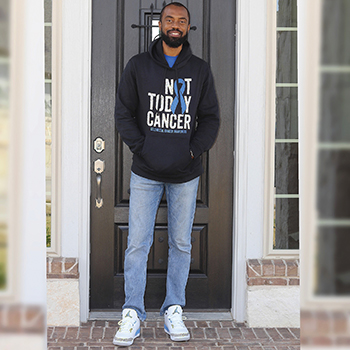Colon Cancer Survivor
Support and Perspective Guide This Young Cancer Survivor
 Diagnosed with Stage IV colon cancer at just 33 years old, Jeremy Echols strives to keep a healthy mindset. He encourages others who are facing the disease to surround themselves with a solid support system.
Diagnosed with Stage IV colon cancer at just 33 years old, Jeremy Echols strives to keep a healthy mindset. He encourages others who are facing the disease to surround themselves with a solid support system.
Consistent abdominal pain was my first symptom. A month later I started noticing blood in my stool, so right away I booked an appointment with a colorectal surgeon. I was 33 years old and in great physical condition. I practically lived at the gym, followed a strict meal plan, never smoked and was not a heavy drinker. We had no reason to believe it would be anything serious, but the surgeon scheduled a colonoscopy “to be sure.” I’m so grateful he did.
I had the colonoscopy, and the surgeon found a mass. He wasn’t sure what it was but said he’d know after results came back from the biopsy.
A week later I received a voicemail while I was at work. Typically I don’t listen to voicemails, especially at work, but for some reason I listened to this one. It was from a cancer center calling to schedule a new patient appointment. That’s how I found out I had cancer — through a voicemail. I found an empty conference room and just cried.
The first person I called was my Dad. He had been diagnosed with stomach cancer just three months before. He was my strength throughout the entire process.
I met with an oncologist who told me the cancer was Stage I and that my prognosis was really good. Fortunately for me, my wife is a pharmacist with knowledge and experience with cancer drugs. Having her with me to ask questions and eventually agree with the treatment plan made me comfortable. I also met with a cancer genetic counselor and had testing. Results came back negative for any gene that would predispose me to colon cancer.
I was scheduled for surgery the next month. They said that depending on how it went, I MIGHT have a few cautionary rounds of chemotherapy. I had a 7-hour laparoscopic procedure to remove a section of my colon. My hospital stay was four days followed by about six weeks of recovery.
During my recovery, I had a PET and expected to hear “you look great and don’t need chemo.” Unfortunately, my oncologist said the results showed evidence of disease in my liver and aorta. My diagnosis was upgraded to Stage IV, and I needed full chemotherapy.
That was the moment I just knew I was dying. My friend came with me to that appointment and he said “God is going to take care of you.” I replayed those eight words continuously during treatment.
There is no special formula for chemotherapy. The physical side effects were rough, especially in the beginning. I actually thought I wouldn’t have any. I was wrong. One thing that helped was keeping a treatment journal. I wrote down what and when I ate and what time I started experiencing different side effects. That really helped me anticipate how future rounds of treatment would go. It got “better” as treatment progressed because I knew what was coming.
I became much more concerned about the mental battle I was facing. One of the first things I did after starting chemotherapy was schedule sessions with a therapist. I wanted to face everything head on and not bury my emotions.
After 12 rounds of chemotherapy, I received the news that my scans were “stable” and treatment would end. As great as that was to hear, it was also the same day that my Dad passed away.
I continue to have follow-ups every three months. I still get anxious but I have learned how to identify anxiety early and not let it spiral out of control. I also had genomic testing for the first time at my last follow-up, and am awaiting the results.
One thing I wish I had known was how to redefine normal. I put a lot of pressure on myself to hurry back to my old self (even while I was still going through treatment) and that only led to disappointment. Be patient with yourself and take everything a day at a time. It took a while but I’m happy to be getting active again. The path will be challenging but I just keep putting one foot in front of the other.
It’s important to surround yourself with a strong support system. I had a couple of friends (as young as I am) who were diagnosed with breast cancer. They encouraged me when I needed it. It made me realize that sharing not only gave me an outlet, it helped others know they aren’t alone. That’s been my goal. I’ve been able to meet some awesome people and connect with great organizations like Fight Colorectal Cancer since I started sharing my story.
You will have good and bad days, but remember that everything is temporary. It’s okay to be down at times, but try not to stay there. A healthy mindset is essential. I wouldn’t say I’m strong, but rather I keep a proper perspective. My faith and family are what helps me with that. Be sure to find what helps you.


